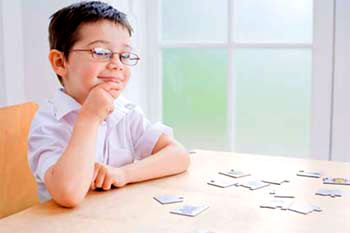Critical thinking is broadly defined as the process in which we evaluate and analyze information to gain a fuller understanding of a particular subject or problem, and then use those findings to form conclusions and inform future decision-making.
Here at LearningWorks for Kids, we categorize the processes of problem-solving and critical thinking into eight core thinking skills — Focus, Flexibility, Organization, Planning, Self-Awareness, Self-Control, Time Management, and Working Memory. These thinking skills are derived from years of research into executive functions — the brain-based cognitive skills that manage critical thinking.
The individual thinking skill pages below provide insight into the operation of these critical thinking skills, and how each skill can affect your child’s learning and behavior, both at school and at home.
Flexibility: Flexibility helps your child to adapt and adjust to changing conditions and expectations without becoming frustrated.
Self-Awareness: Self-Awareness helps your child to understand and articulate his own thoughts and feelings as well as the thoughts and feelings of others.
Focus: Focus helps your child start a task without procrastinating and then maintain his attention and effort until it’s done.
Self-Control: Self-Control helps your child to manage her feelings and behaviors, and stop herself from acting inappropriately.
Organization: Organization helps your child to arrange and coordinate materials and activities in order to complete a task.
Time Management: Time Management helps your child to be aware of her use of time and to manage her schedule and tasks efficiently.
Planning: Planning helps your child to develop a systematic approach for setting and achieving goals by understanding step-by-step processes.
Working Memory: Working Memory helps your child to recall and retain information in his mind while working.




